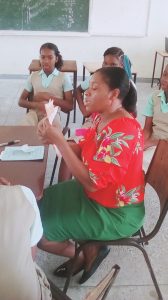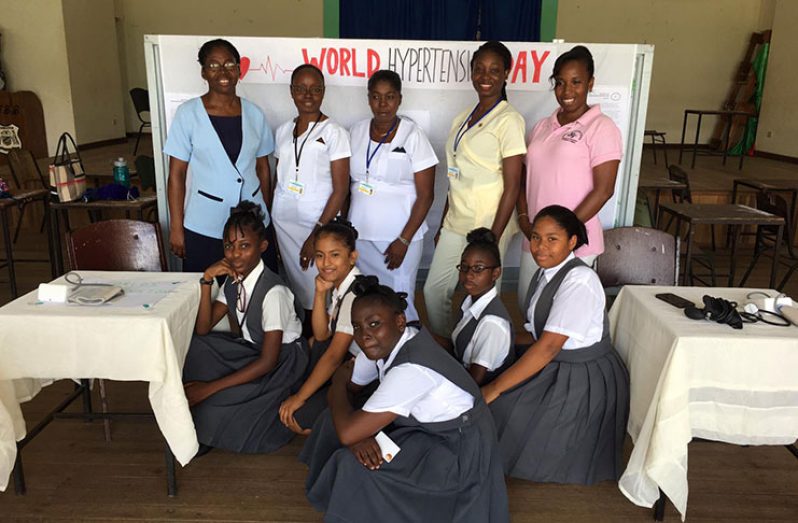Making an impact in the lives of students and the community
By Gibron Rahim
THE health and wellbeing of our children should be of paramount concern. The idea that children are the future, while often stated, does not lose its meaning regardless of the frequency with which it is repeated. It is for this reason that the Secondary School Health Clubs programme has been reintroduced in schools across Guyana. These health clubs are already making a difference in the lives of the students of Region 10.

The Pepperpot Magazine spoke with Dr. Faqueeda Watson-Jones, School Health Officer within the Adolescent Health Unit of the Ministry of Public Health to gain insights into the impact the Secondary School Health Clubs programme is having in the region. Watson-Jones noted that the school health clubs were recently relaunched with the training of teachers from 16 secondary schools in Regions Three, Four and 10 being conducted this past March and April.
In Region 10, Watson-Jones related that Mr. Vernon Todd of “For the Children Sake Foundation” and the Adolescent Health Unit in Region 10 had created “health corners” where peer educators held talks with secondary students. However, there had been no official training until March and April. “Since they’ve been trained, they currently have the health clubs,” she said.
Before the health clubs carry out activities, they are encouraged to conduct needs assessments for the students and the community. Watson-Jones pointed out that it would be futile to conduct activities without first being aware of the needs of the community. After the needs assessment is conducted, the health clubs analyse and graph the results so they can understand what the issues affecting the members of the community and their fellow students are. “And from the issues, they can now have activities,” said Watson-Jones.

Watson-Jones emphasised that even though the health clubs are benefitting the students, they are also aimed at benefitting the entire community. For this reason, the health clubs must involve two or three positive persons from the community and two or three parents from the parent teacher association (PTA). This allows for community members to provide support and act as liaisons while parents can feel involved in their children’s lives.
The Secondary School Health Clubs programme is also inter-ministerial, according to Watson-Jones. She related that, though it is run by the Ministry of Public Health, she has also involved persons from other government ministries including the Ministry of Education and the Ministry of the Presidency, Department of Social Cohesion, Culture, Youth and Sport. “The health club is not just looking at health but also social issues that are affecting the youth,” she explained.
For her part, Watson-Jones is committed to continuing to work on capacity building for the teachers and students of schools. The first capacity building workshop will be held in July for teachers and some of the students involved in the health clubs. The workshop will include lessons on proposal writing for teachers and empowerment sessions. This will include empowerment sessions aimed at boys which Watson-Jones noted is important given the number of domestic violence-related murders of women in Guyana.
Mental health issues will also be addressed at the workshop. Watson-Jones noted that numerous cases of mental health issues in schools were reported to her by teachers when she was assessing their prevalence in schools. The health clubs are not just geared at sensitising teachers and students but also parents, she said. “You have to target everyone because everyone plays a role in the child’s life and that’s why we need everyone to come on board.”
The work of the clubs

The schools in Region 10 with health clubs are Wisburg Secondary School, Linden Foundation Secondary, New Silver City Secondary, Mackenzie High School and Harmony Secondary. The Pepperpot Magazine was able to speak to teachers from four of these schools who shared the difference the health clubs are having within their respective schools and communities.
Ms. Alissa Nedd of Wisburg Secondary School related that, so far, the health club has been successful at her school. “The children are very interested in the topics that they are dealing with,” she said. “It’s definitely having a positive impact because they are learning a lot about themselves.” The students are opening up and asking questions. In fact, the health club at Wisburg Secondary has a question box where students can anonymously ask questions about any issues that are bothering them. “At every club, we will choose two questions from that box and we will answer them as best as we can.” She noted that the health club intends to start a feeding programme as well as a healthy eating programme for students.
At Linden Foundation Secondary, Ms. Clair Fraser noted that the programme is going quite well, though there are some challenges in terms of attendance and punctuality. She reported that there are quite a few committed students who are dedicated to making a change in the community and in the school. It is the influence of these few that Fraser related has to be passed on to their fellow students. “That we have not seen yet because we are a little way into the club, we are not too long formed,” she said. She related that numerous activities such as World AIDS Day, Caribbean Mosquito Awareness Week and World Hypertension Day have been observed at the school where students educate their peers and members of the community on issues. She shared that the school has submitted a proposal to the Office of the President and will soon be embarking on a project to recycle plastic.
Ms. Anaasa Andries of New Silver City Secondary said that the establishment of the health club at the school has been very effective in the sense of sharing health advice to individuals. “It’s something that they really look forward to, especially the teenage girls” she related. Discrimination has been among the topics addressed so far. Andries noted that the students have been very enthusiastic and willing to participate in activities. She has observed that certain individuals from the health club are advising others on topics they have learnt in health club sessions, especially discrimination.

Mackenzie High School’s health club is currently working on its logo. Ms. Vanessa Kissoon, a teacher at the school, told the Pepperpot Magazine that a competition had already been held to determine the health club’s name. She noted that there are activities planned such as an early morning health walk and a poster competition. Kissoon said that students have been very receptive to the idea of the health club. She pointed out that the health club can be a forum to discuss issues such as domestic violence with both male and female students. She added, “I like to teach young people to give back.” She expressed the hope that health club members who graduate school would take the opportunity to give back to the health club and encourage their colleagues.
The current health clubs will be monitored for one year. Assessments of successes and failures will be done. In the following year, the programme will be expanded to primary schools and other secondary schools in other regions. Watson-Jones noted that there are unique issues that children transitioning from the primary level carry with them to the secondary level. She pointed out that there is a need for activities in schools. “We need to work more with schools and that’s why we have the health clubs – so that we can be able to work more with schools in targeting different aspects.”




.png)









